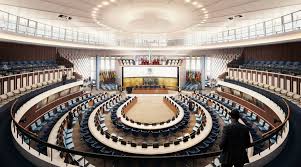After years of intensive renovations, Africa Hall, the iconic birthplace of the Organization of African Unity is being inaugurated. Commissioned by Emperor Haile Selassie I, the 1961 Arturo Mezzèdimi modernist masterpiece was designed as a place where Africans could meet to deliberate on pressing issues – independence, freedom, development and a brighter future.
As the headquarters of the United Nations Economic Commission for Africa (ECA), it has hosted countless conferences since the 1963 signing of the Charter for the Organisation of African Unity (OAU) by the heads of African States and the establishment of the OAU, the precursor to the African Union (AU).
The signing of the charter in Africa Hall is regarded as a significant achievement of unity for Africa’s post-colonial history.
While attempts to renovate it had started in earnest in prior years with previous executive secretaries advocating for funding to rehabilitate its crumbling structures, it was during the 50th anniversary of the ECA, that the initiative for the renovation of Africa Hall as “a monument to African history” was launched in collaboration with UNESCO, the African Union Commission, and the government of Ethiopia.
ECA, with the support of national and international experts, had completed the feasibility study and the concept design in 2014 and the 70th session of the UN General Assembly approved the renovation project, entrusting ECA with the implementation.
With an ambitious renovation plan and extensive advocacy among member states, a groundbreaking ceremony amplified its cultural significance as a heritage with tourism potential for Ethiopia, beyond one of the state-of-the-art conferencing venues and despite the COVID-19 pandemic, renovation works pushed on and Africa Hall has slowly emerged into a modern facility, with a new visitors centre and a permanent exhibition, while respecting the architectural and artistic vision of the ‘60s.
Voluntary contributions from member states such as Mali and Portugal have helped to enhance the renovation. For instance, Portugal contributed towards the restoration of Ethiopian Maitre, Afework Tekle’s Triptych – an artistic stained-glass masterpiece which stands at the entrance of Africa Hall themed, The Total Liberation of Africa.
Commissioned by the late Ethiopia’s Emperor Haile Selassie I and inaugurated in 1961, the 150-square meter stained-glass mural encapsulates the challenges, aspirations and future of Africa. Experts hail it as “an extraordinary study on the soul of the continent, which has over the years, grappled with claiming its own destiny.” Additional artistic expressions are housed within Africa Hall, donated primarily by member states.
Following the inauguration, there will be side events culminating with UN Day on 24 October.
WN/as/APA


